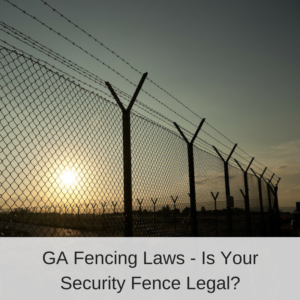 Security fences are designed for the safety and protection of the residential or commercial properties they enclose. While there are no specific, state-wide fencing laws in Georgia, it’s important to check the ordinances set by your local town or county before starting a fence installation project. This is especially important if you plan to protect your property with an electric perimeter security fence because many cities and townships have rules and limitations regarding electric fences. Don’t get caught with an illegal security fence — use the following as an overview of typical fencing laws.
Security fences are designed for the safety and protection of the residential or commercial properties they enclose. While there are no specific, state-wide fencing laws in Georgia, it’s important to check the ordinances set by your local town or county before starting a fence installation project. This is especially important if you plan to protect your property with an electric perimeter security fence because many cities and townships have rules and limitations regarding electric fences. Don’t get caught with an illegal security fence — use the following as an overview of typical fencing laws.
Building Permits
The need for a building permit varies by cities and counties. Some areas require permits for any project, some only require projects based on a monetary amount, and others require building permits when the site of construction is within a historic or another special district. If you live in an area that requires a permit and you don’t get one, you could be faced with a stop-work order.
Fence Height
For residential areas, local rules typically restrict fence heights to no more than six feet in the backyard and no more than four feet in the front. Exceptions can be made for situations such as excessive noise or light located near your property. In addition to checking city and county ordinances, you’ll also want to determine if your neighborhood association has its own set of regulations regarding security fences.
Fence Materials
Typically, chain link and woven wire fences are not permitted in the front yard. In fact, many areas require that front yard fencing is built from ornamental materials, such as split rail, picket, brick, or metal.
Residential lots with less than three acres of property cannot have barbed wire or electric fences. If an electric fence is allowed on your property, providing adequate signage and limiting the wattage you’re allowed to run through the fence is required.
Fence Location
It’s critical that you have your property line surveyed and defined before starting a fencing project. If your fence goes onto your neighbor’s property, that section of fencing is legally theirs. It’s a good idea to leave enough space between your fence and the property line to allow access for maintenance purposes without intruding on someone else’s property.
Trust the Experts
Understanding the various rules and regulations regarding fencing laws can get complicated, which is why it’s a good idea to leave it to the experts. America Fence Company will help you identify the necessary building permits and procedures for your city or county, keeping your fence legal and compliant. We also offer free consultations and concise estimates to help you determine which fence type is best suited for your needs. Contact America Fence or call 770-931-4077 to get your fence project started today.